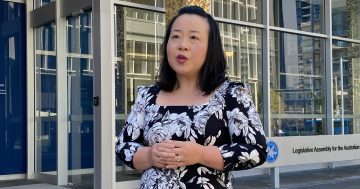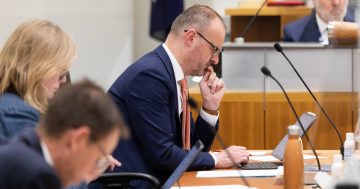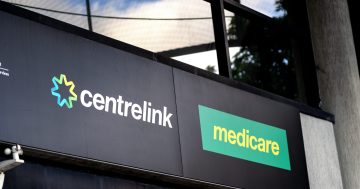
RACGP NSW/ACT chair Dr Rebekah Hoffman and Canberra GP Dr Clara Tuck Meng Soo want the ACT Government to consider other exemptions to its payroll tax. Photo: Supplied.
A professional body representing Canberra doctors wants the ACT Government to “step up with a solution” to payroll tax and patient costs in the Territory.
The Royal Australian College of GPs (RACGP) has been advocating for the Territory to scrap what’s been labelled the ‘sick tax’ for the past year. It has also been critical of the ACT Government’s temporary payroll exemption for clinics which increase their bulk billing rates to 65 per cent of patients.
Canberra’s GP bulk billing rates continue to be among the lowest in the country.
RACGP NSW/ACT chair Dr Rebekah Hoffman said increasing bulk billing practices was increasingly unviable in the Territory and the ACT needed to think of a more workable solution.
“Unfortunately, the ACT Government has left GPs with no choice but to increase fees … this GP payroll tax is a tax on patients, and unfortunately, it will bite,” she said.
“If other jurisdictions offer better renumeration and cheaper cost of living, more GPs will leave and fewer GPs will come to Canberra.”
The Chief Minister argued the ACT’s payroll tax-free threshold of $2 million meant less than 10 practices would actually be impacted.
Dr Hoffman said this had not been the case in the past six months.
“What we’ve been seeing is that practices are charging more, people are having to make decisions about whether they access healthcare, save all their problems up to see a doctor at once, or not go at all,” she said.
Previously, clinics would only pay the tax if a patient’s fee was paid into the clinic’s bank account.
If the payment went directly into the independent, contracted GP’s account, it didn’t count as being on the payroll.
Practices would still pay payroll tax on the salaries of employees such as nurses and receptionists, while the billings of independent GPs (who would pay a percentage of billings to the practice to cover room hire) were exempt.
This changed following a NSW court decision which found payroll taxes should also be imposed on independent GPs operating out of a clinic.
Given most doctors in Canberra run as independent contractors, many clinics have had to introduce extra patient levies to cover costs.
One of those clinics is the East Canberra General Practice.
Principal Dr Clara Tuck Meng Soo said her practice had brought in a $3 levy on privately billed patients.
“We simply don’t have the profitability to afford to absorb payroll tax on patients’ behalf … we’re at the lower end and still coming up short from where we were before payroll tax was imposed on independent GPs,” she said.
“The ACT Government knows it’s creating challenges for their communities, but their offer to waive payroll tax on practices that increase bulk billing to 65 per cent of patients doesn’t make sense.
“Even with a tripled bulk billing incentive for some patients, we’d be making a loss in the high-cost environment of Canberra.”
A recent HotDoc survey found general practices expected an average $12 increase for a standard 20-minute consultation as a result of the tax.
Queensland recently decided to only impose the payroll tax on clinics which billed under the previous method.
Dr Hoffman said this was the most attractive solution (outside of scrapping the payroll tax completely) because it meant only some backend banking practices would need to be changed, rather than patient care.
“Ideally, the government would exclude all GPs [from being included in the payroll tax], but we’ve been told outright that’s not going to happen,” she said.
A spokesperson said the ACT Government maintained its view most GP healthcare centres would fall under the $2 million payroll tax threshold and not be impacted.
“The contractor provisions are a long-standing feature of the payroll tax laws and there have been no recent changes to these provisions or any reinterpretation of payroll tax legislation,” the spokesperson said.
“The ACT Government has not introduced a new tax on medical practices or made any decisions which applied payroll tax to medical practices.
“Medical practices are treated the same way as any other business operating in the ACT for payroll tax purposes.”
The spokesperson said Queensland’s approach wasn’t consistent to other jurisdictions and the ACT Revenue Office didn’t consider the state’s policy aligned with the ACT’s Payroll Tax Act 2011.
The government has no intention to provide further concessions to medical practices beyond those already announced.
“Payroll tax relief for medical centre businesses aligns with the government’s vision by offering medical practices the necessary time and support to ensure compliance with the Territory’s payroll tax laws,” the spokesperson said.
“The government’s commitment to accessible and affordable healthcare for all Canberrans is unwavering.”
The Canberra Liberals have committed to abolishing the tax if the party wins the upcoming ACT election.




















